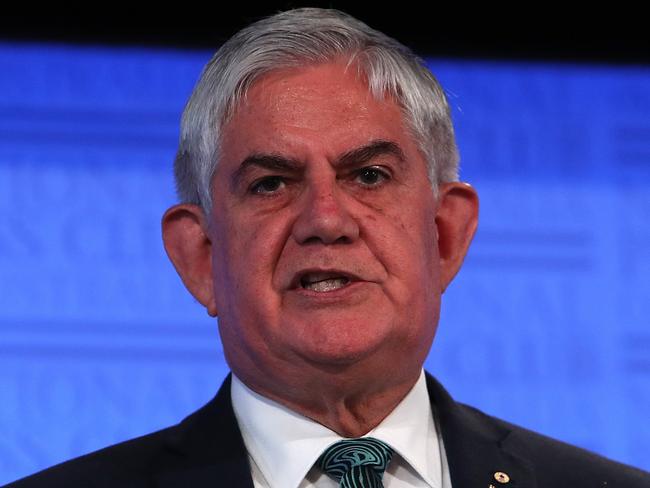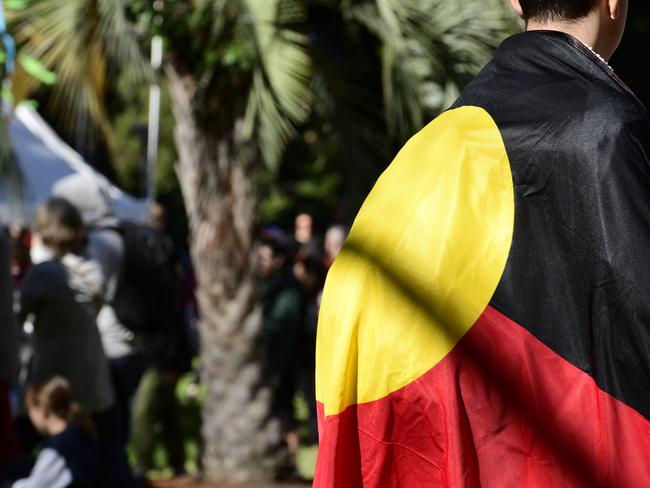Ken Wyatt’s stance has the potential to split the government
Ken Wyatt’s plan for an indigenous voice to parliament would have split the government and left our country more divided by race and identity politics than ever before, writes Peta Credlin.
It’s hard to avoid the suspicion that Ken Wyatt, the new Minister for indigenous Australians, is trying to railroad the government into a much more radical position on Aboriginal empowerment than it’s likely the Prime Minister wants. Either that, or he’s broken one of the first rules of politics: making a speech to the National Press Club without properly thinking it through.
Last month, I wrote about another proposal from Wyatt, this one from his time as co-chair of the joint standing committee on constitutional recognition, where he wanted to set up a Makarrata Commission, a kind of parallel government for indigenous people.
He had even drafted pages and pages of legislation to make this new body a reality, until the Morrison government disowned the idea.
MORE FROM PETA CREDLIN: ‘Deluded conservatives’, take a bow
But instead of making the new minister cautious about public kite-flying, the rebuff must have emboldened him because last week he was at it again, telling the nation’s media that he wanted to see a constitutionally entrenched indigenous voice to the parliament if it could become the “consensus option” for constitutional recognition.
Even after the subsequent three days of confusion — with the Prime Minister ruling out a constitutionally entrenched indigenous Voice and distancing himself from any special new body chosen by indigenous people, for indigenous people — Wyatt was still at it, saying that a legislated Voice to parliament could be a “better way”.
I suppose you can hardly blame the first indigenous person ever to hold the indigenous portfolio for wanting to make his mark, but the way he’s going about it will split the government, risk enshrining policy that’s Labor not Liberal, and leave our country more divided by race and identity politics than ever before.

Constitutionally entrenched or just legislated, like the ultimately abolished ATSIC two decades ago, a special body chosen by Aboriginal people with a remit to bring an Aboriginal perspective to all the decisions of the parliament is a really bad idea. A legislated body, snuck in by the back door through parliament, would actually be worse than a constitutionally entrenched one, which at least the people would have voted for.
Sure, Aboriginal people are the First Australians, but that shouldn’t make the rest of us second-class citizens. We wouldn’t have a women’s body chosen only by women to advise the parliament on women’s issues; and we wouldn’t have a migrant body chosen only by migrants to advise the parliament on ethnic issues, so why should we have a special indigenous body asserting what would become a kind of veto on the decisions of the government and the parliament?
Anything that ends up dividing Australians, rather than helping to unite us, takes us backwards, however well-intentioned the Minister might be. Wasn’t the fight against racism all about judging people, in Martin Luther King’s immortal words, on the content of their character rather than by the colour of their skin? Didn’t the famous US court case, Brown v Board of Education, overturn the pernicious doctrine of “separate but equal”? Wasn’t our 1967 referendum, hailed then and since as watershed for our country, about treating Aboriginal people the same as everyone else, not differently?

So why on earth would we want to revisit having two classes of citizens: indigenous people, who could vote twice — once for the parliament and then again for an indigenous voice (constitutionally entrenched or merely legislated) — and everyone else, who could only vote once, and whose parliamentary representatives would be subject to second-guessing by an indigenous advisory body that would get a say on everything, because doesn’t everything impact on Aboriginal people? If it didn’t, that’s racist by its very definition.
The best way to ensure that there is an indigenous Voice to the parliament is to have indigenous people in the actual parliament itself, elected fair and square, on the same basis as everyone else.
MORE FROM PETA CREDLIN: What the left fails to grasp about Adani
Thanks to Wyatt, and thanks also to Pat Dodson, Linda Burney, Malarndirri McCarthy and any other MP who identifies as Aboriginal, we have an indigenous Voice already. As Aboriginal Australians and as Members of the Australian parliament, they should be the only indigenous Voice to the parliament that we ever need.
With a small and potentially fragile majority and with a proud and headstrong minister, as well as the Quiet Australians to keep on-side, Scott Morrison will have to tread carefully.
Sure, keep working on constitutional recognition, provided it doesn’t create first and second-class Australians and that it doesn’t create a new class of rights. Until then, someone needs to remind Wyatt being Minister for indigenous Australians doesn’t mean to the exclusion of everyone else.
Originally published as Ken Wyatt’s stance has the potential to split the government



